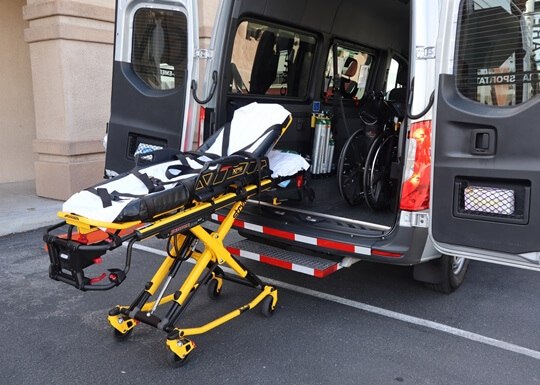Comfortably Get To Healthcare with Medical Transportation Services Near Me
Comfortably Get To Healthcare with Medical Transportation Services Near Me
Blog Article
Available and Affordable Medical Transport Options for Seamless Wellness Support
In the realm of health care, the ease of access and price of medical transport are paramount in making certain individuals can access the care they require when they need it. The capacity to perfectly navigate transportation alternatives can considerably influence an individual's capability to receive prompt medical attention, follow-up care, and general well-being. From non-emergency clinical transport solutions to cutting-edge services like telehealth, the landscape of clinical transport is developing to meet the diverse needs of individuals. Considering the significance of this aspect in healthcare distribution, discovering the variety of options available comes to be vital for resolving voids in accessibility and cost.
Non-Emergency Medical Transportation Provider

These services are staffed by qualified professionals who prioritize client comfort and safety and security during transportation. Chauffeurs are outfitted to take care of individuals with varying clinical demands and make certain that all trips are worry-free and smooth - Medical Transportation Services Near Me. In addition, non-emergency medical transport solutions usually utilize specific lorries that are wheelchair-accessible, making them ideal for a wide variety of clients with various movement demands
Volunteer Motorist Programs
Volunteer vehicle driver programs contribute in supplying transport aid for people seeking non-urgent treatment. These programs count on the generosity of volunteers that donate their time and cars to assist transport people to and from medical consultations. By using volunteer motorists, companies can provide an affordable remedy for individuals that might not have access to trusted transportation.
Among the key benefits of volunteer motorist programs is the customized treatment and attention that people obtain. Unlike typical transport solutions, volunteer vehicle drivers frequently develop a relationship with the people they aid, creating a thoughtful and encouraging environment throughout what can be a difficult time. Furthermore, volunteer vehicle driver programs can assist link the gap for individuals staying in underserved or country locations where public transport choices may be restricted.
Public Transport Options

Among the vital benefits of public transportation is its extensive availability in rural and metropolitan locations alike. This comprehensive network enables clients from diverse backgrounds to travel to clinical consultations with family member simplicity. Furthermore, mass transit systems are frequently equipped to suit people with impairments, giving easily accessible traveling options for those with mobility difficulties.

Ride-Sharing and Transportation Network Business
The development of visit modern-day transport options for medical objectives prolongs beyond standard public systems like trains and buses to include the cutting-edge world of ride-sharing and transport network companies. Ride-sharing services such as Uber and Lyft have reinvented the way individuals take a trip to medical visits, offering convenience and adaptability to clients that may not have access to their automobiles or conventional mass transit. These platforms allow customers to request a ride with the touch of a button on their smartphones, offering door-to-door solution that can be specifically valuable for people with movement obstacles or those calling for aid.
Transportation network business (TNCs) have likewise played a considerable duty in bridging the gap in clinical transportation services. Companies like Veyo and RoundTrip concentrate on non-emergency clinical transport, catering to people that need a greater degree of assistance during their trips to clinical facilities. By partnering with health care carriers and insurance firms, TNCs ensure that patients can access timely and dependable transportation options, ultimately adding to improved health results and client fulfillment.
Telehealth and Online Appointments
Enhancing health care access and ease, telehealth and virtual appointments have actually arised as pivotal components in contemporary medical methods, revolutionizing the method individuals engage with medical care carriers. Telehealth leverages modern technology to assist in remote communication between clients and medical care experts, offering a large variety of solutions such as digital examinations, remote monitoring, and digital prescriptions. Virtual appointments enable clients to seek medical advice, medical diagnosis, and treatment from the convenience of their homes, removing the need for physical sees to medical care facilities. This approach not just conserves time and minimizes transportation costs see here now for people yet also enhances the total performance of healthcare shipment.
Moreover, telehealth plays a vital role in extending clinical solutions to underserved neighborhoods, backwoods, and people with limited wheelchair. By breaking down geographical barriers and increasing medical care outreach, telehealth promotes very early treatment, continuity of care, and client involvement. As technology continues to breakthrough, telehealth is poised to play a significantly substantial duty in forming the future of health care shipment, cultivating enhanced wellness outcomes and individual fulfillment.
Conclusion

From non-emergency medical transportation services to cutting-edge services like telehealth, the landscape of medical transportation is evolving to satisfy the diverse needs of patients.Non-Emergency Medical Transport Solutions promote the prompt and secure transport of individuals requiring non-urgent medical treatment to and from healthcare facilities.The advancement of contemporary transport options for medical objectives prolongs beyond standard public systems like buses and trains to incorporate the cutting-edge world of ride-sharing and transportation network firms.Transportation network firms (TNCs) have actually additionally played a considerable function in connecting the void in clinical transportation services. Non-Emergency Medical Transportation Providers, Volunteer Chauffeur Programs, Public Transport Options, Ride-Sharing and Transportation Network Business, and Telehealth and Virtual Consultations all play a critical duty in dealing with transport barriers to medical care accessibility.
Report this page